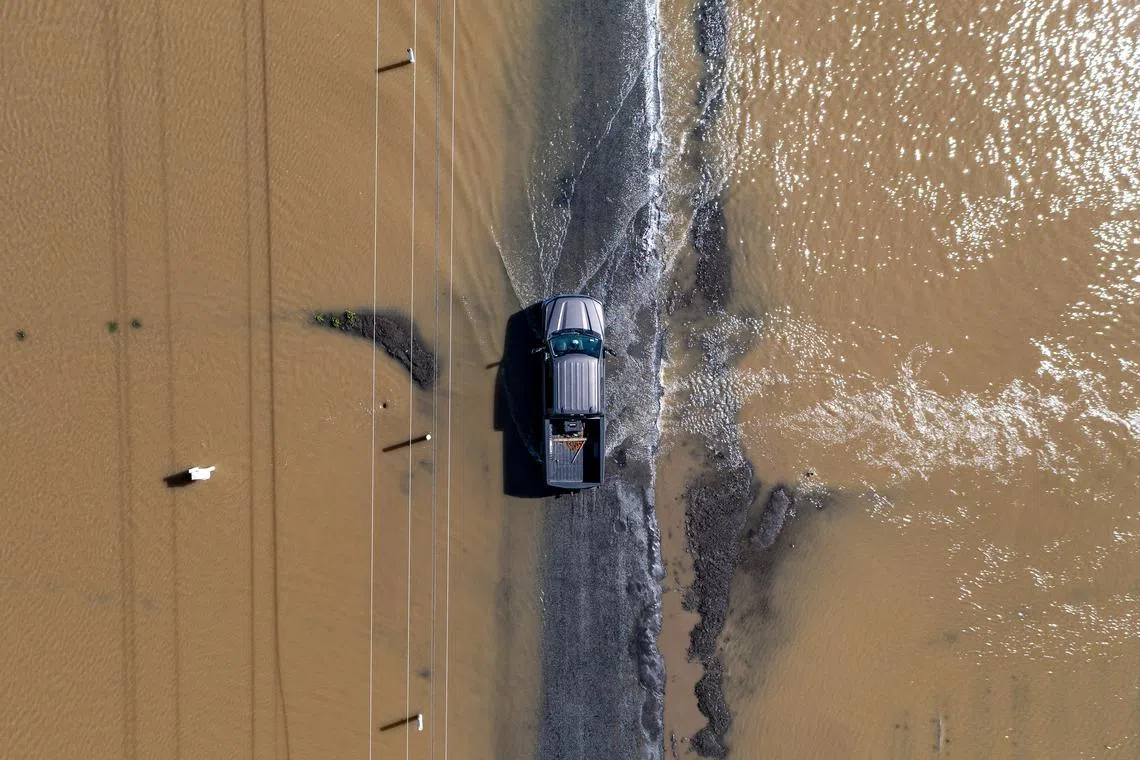Winter storms drench California with flooding, bury north-east under snow
Sign up now: Get ST's newsletters delivered to your inbox

A flooded road from a breached levee on the Pajaro River in Monterey County after storms hit Northern California, on March 15.
PHOTO: EPA-EFE
Follow topic:
NEWPORT BEACH, California – An atmospheric river dumped more torrential rain on California
The West Coast is getting pounded by an usually wet season following two decades of drought, creating havoc on roads and endangering bluff top homes along the coast in southern California’s Orange County.
“It’s been fire to ice and no warm bath in between,” said Governor Gavin Newsom, referring to the state’s pivot from wildfires just a few months ago to one of the snowiest winters on record.
The governor has declared a state of emergency in 43 of California’s 58 counties.
More than 130,000 homes and businesses remained without power on Wednesday, according to PowerOutage.us
The 11th atmospheric river of the season prompted officials to warn of potential flooding and mudslides from heavy rain, melting snowpack, saturated soils and swollen streams.
By Wednesday afternoon the heavy rainfall associated with the atmospheric river in California had ended, with only light showers persisting in southern California, but forecasters warned of a possible 12th atmospheric river next week.
Atmospheric river describes airborne currents of dense, tropical moisture from the Pacific.
A series of them lashed California in rapid succession from late December through mid-January, killing at least 20 people.
Four people have died in the most recent storm, Mr Newsom said while touring flood damage in Pajaro, on the state’s central coast, where a levee broke on Saturday, forcing many of the town’s 2,000 people, most of them Latino farmworkers, to evacuate.
“We’re tired. Everybody’s tired,” Monterey County sheriff Tina Nieto told the same news conference where Mr Newsom spoke.
“It’s hard for some of our most economically impoverished neighbours.”
Monterey County reissued an evacuation order for a 40km stretch along the Salinas River and Highway 101, most of it low-lying farmland. Numerous coastal and inland roads were closed.
The Sacramento River, the longest in the state, was reaching flood stage just below Shasta Dam, the state’s largest reservoir, the National Weather Service said, issuing flood warnings to several towns along the river.
In Tulare County, a farm region in the San Joaquin Valley, the Success Lake reservoir reached its capacity, forcing officials to release water through the Schafer Dam spillway and ordering evacuations downstream.
While agricultural communities got pummelled in the north, wealthy coastal communities took the brunt of the storm in southern California.
In Newport Beach, an upscale Orange County enclave, one home with spectacular ocean views hung in the balance as the bluff top beneath it collapsed.
In nearby San Clemente, bluff top properties were evacuated due to landslides, including one where a backyard swimming pool was left dangling over the precipice.
“It sounded kind of like an earthquake,” said Mr C. J. Smith, 41, whose home was affected.
He acknowledged the dangers that come with living on a bluff above the beach. “The views are beautiful. To us, it’s kind of worth the risk.”
Pacific Coast Highway was closed at several points along the Orange County coast.
In the north-east, a late-winter blizzard dumped about 60cm of snow in the Berkshire mountains of western Massachusetts and north-western Connecticut, and 30cm or more in parts of New York’s Hudson Valley.
Across Massachusetts the accumulations left by the nor’easter – a type of storm that affects the United States East Coast and is named after the direction of the wind – varied greatly.
In Colrain, in the north-western part of the state near the Vermont border, 91cm of snow was on the ground, while Boston’s suburbs had about 2.5cm.
Colrain town administrator Kevin Fox said he had no electricity or cell service at his home and had gone to his office, even though town hall was closed, so that he could call his mother.
“I have no idea who has power or who doesn’t,” Mr Fox added. REUTERS

